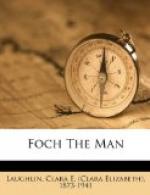We don’t know much, yet, except of a very superficial sort, about those days. We know what happened in them insofar as army movements are concerned, and the heartbreaking re-occupation of towns and villages where French and American restoration squads were working to make habitable those places the Huns had laid waste; and the continued shelling of Paris by the “mystery gun”; and the great exodus of civilians from the capital as the ravaging hordes drew nearer and always nearer.
These things we know; but not what Foch was thinking—except that he was not thinking of defeat.
If there was a true heart in France that ever for a moment doubted the outcome of the war, or dreamed of abandoning the conflict before it had made the future safe, I have never heard of that one.
Certainly the man who was leading them never doubted. Nor was it on his own skill that his faith was founded. He knew Who would give his cause the victory.
In the fifth German drive of 1918 the enemy crossed the Marne! Paris was almost in sight—Paris! where millions of French were celebrating the fall of the Bastille and the birth of freedom as if the leering, jeering enemies of all freemen were not so close to the gates of the Capital that the gleam of their tusks might almost have been seen from the city’s outermost ramparts. Certainly the drunken fools within—drunk with their deep draughts of liberty—could hear the snarling and snapping of the approaching wolves, the baying of Big Bertha, the barking of her smaller sisters! But it would be like those crazy French to dance and sing and celebrate the overthrow of autocracy, while an autocracy the like of which no French King had ever exercised was on the eve of engulfing them.
So the German General Staff said, sneering, as it laid its plans for the final drive on Paris. They would start that drive on the night of July 14, while the fools were celebrating, when they were least expecting an attack. Probably most of them would be drunk. Oh, almost certainly! Their resistance would be weak, And for all time thereafter it would make an impressive tale for schoolbooks throughout the Pan-Germanized world, that democracy was dispatched in her last orgy of exultation.
As clearly as if he were not only present in the councils of German Headquarters, but present inside the thick round skulls about the council table, this boche attitude and intent was comprehended by the small frail man at Mormant, where his Headquarters then were.
On that night of July 14 he began the great offensive which never stopped until the whining boche was east of the Rhine!
His Intelligence Department told him that the German drive would probably begin at ten minutes past midnight. They might be quite wrong, but that was their guess. Foch was all-but sure they were not wrong; that it was not in German nature to reason other than as I have described.




